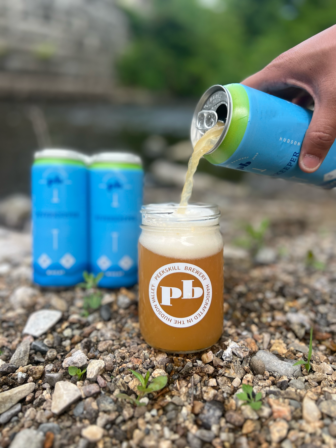Environmental group, brewery release new beer
Generally, if a beer you’re drinking conjures thoughts of polluted wastewater, that means something in the brewing process has gone horribly wrong.
That’s not the case with “Riverkeeper,” a new beer by Peekskill Brewery made in collaboration with the eponymous, Ossining-based environmental organization. The refreshing hefeweizen-style brew is made, like all of the brewery’s beers, using the water from Peekskill Hollow Brook.
Riverkeeper is currently working with the City of Peekskill on how to protect the brook, which supplies its residents with drinking water, and thought that a beer highlighting it would complement the initiative. Brandon Cruz of Peekskill Brewery said that they didn’t need a lot of convincing to team up with Riverkeeper.
“Water is one of the four ingredients in beer,” he said (the other three usually being yeast, hops and barley), so brewers are already obsessive about local water quality. He points to the inability of American brewers to replicate German pilsners.
“No matter how hard you try to duplicate that taste, they’ve been using their specific water for over 100 years,” he said. “Only their beer is going to taste like that. It’s like how bakers in New York and Connecticut say that they make the best pizza and bagels in the world because of the minerals in our water.”
Peekskill Hollow Brook flows from Lake Tibet in Kent, and most people only experience it during the unnerving moment when the Taconic passes through Fahnestock State Park and dips down quickly to cross the rushing water before quickly climbing back up again, said Riverkeeper’s Dan Shapley.
But in addition to providing drinking water to Peekskill, the brook also supplements the water of the Village of Buchanan, where the Indian Point nuclear power plant is located, and serves as a backup supply to Cortlandt, Somers and Yorktown.
“That’s 100,000 people,” said Shapley, the same total population as the Hudson 7 communities upriver that get their water from the Hudson River. “Very few people realize how important that little creek is for this region.”
This isn’t the first time Riverkeeper has collaborated with a brewery. In 2017, the organization partnered with Mill House Brewing Company in Poughkeepsie — one of the communities that draws drinking water from the Hudson — to make an IPA using 17th-century brewing techniques in order to highlight the importance of protecting the river.
But since the brewery was already using water from Peekskill Hollow Brook, how could they further call attention to it? After one of Cruz’s brewers brought sumac and spicebush back from a foraging hike along the brook’s banks, they decided that using those flavorings would give the beer an added sense of terroir (the natural environment in which a wine is made).
Although they were able to forage enough spicebush for the beer, Cruz said they had to supplement the local sumac with some ordered from a nearby source in order to get enough.
“When you drink it, you get these subtle earth notes that bring it some balance and complexity” as a result of the flavorings, said Cruz.
Much as the beer complements Peekskill’s work to protect the brook, a water-quality monitoring program the city developed with Riverkeeper enhances a new two-year water-quality assessment that New York State is undertaking in the Hudson River.
Shapley said that although the Hudson is probably the most studied and sampled river in the country, there’s still a surprising amount about its health that is unknown. The sampling will look at arsenic and cadmium levels, as well as the conditions that would make an increase in future harmful algae blooms likely.
But the state won’t test for the presence of bacteria from sewage. Shapley said that while municipalities that get their drinking water from the Hudson, as well as the very few approved swimming sites on the Hudson, test for sewage, Riverkeeper and its partners are left to routinely test whether swimming or paddling in the Hudson is advisable on any given day for the rest of the river.
This means that even though the federal Clean Water Act, passed more than 50 years ago, is credited for the river’s rebirth, it’s still not known if the river itself is in compliance with the act because the requisite testing has never been done.
Shapley said that Peekskill’s plans will help to fill in the gaps of the state’s plan and show why a proactive water-protection plan is needed, including land conservation.
The U.S. Geological Survey released a report this week showing that about half of U.S. tap water is contaminated with the “forever chemicals” known as PFAS. The Biden administration is seeking to curtail the use of the toxic substances as scientists have discovered that even low levels of the chemicals are much more harmful than previously thought.
“We want to maintain the natural filter that forests provide as much as possible,” Shapley said. “And we want to restrict the use of human uses of the land out in the watersheds for these drinking water sources as much as possible, because we don’t always know where the next contaminant is going to come from.”
Peekskill Brewery is located at 47 South Water St. in Peekskill. The Riverkeeper beer is available on tap and in cans on-site. The brewery is hosting a happy hour with Riverkeeper today (July 7) starting at 4 p.m. and featuring giveaways and kids’ activities.

